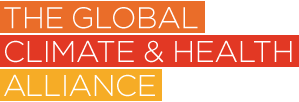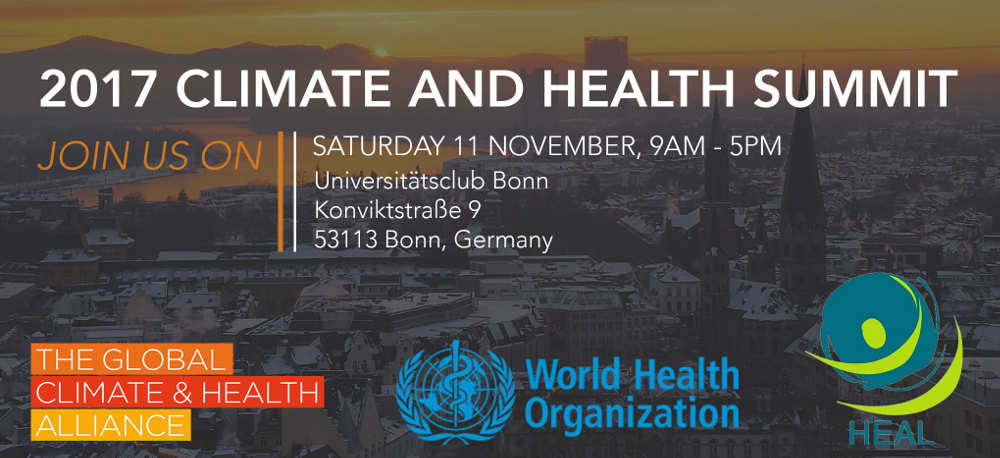
Ramping up Action on Climate and Health in Cities and Regions
Overview
The Paris Agreement, adopted at COP21 in 2015, represented a pivotal moment in determining the global response to climate change. The Agreement came into force in November 2016, signed by 195 out of 197 nations, and (notwithstanding the recent change in position of the United States of America) represents a crucial step towards keeping global aggregate temperatures below 2°C. Many, however, believe that we can do better than 2 degrees. To protect public health, we must do better. There is a call to limit warming to 1.5°C, and to do so, achieve a net downward trend in greenhouse gas emissions by 2020.
Today, 54 percent of the world’s population lives in urban areas, projected to be two thirds by 2050. Climate change poses a differential risk within and among nations, and responses to climate change must address the serious impacts many nations and populations are already experiencing. At the same time, addressing climate change presents an unprecedented opportunity for public health, through climate strategies that offer significant co-benefits addressing some of our most pressing health issues. Climate resilience and adaptation for health, as well as healthy mitigation strategies must be woven into our global health work, and health must be central to our global framework for tackling climate change.
The Global Climate and Health Summit will focus, through a health lens, on action in cities and regions to advance implementation of national targets under the Paris Agreement and build momentum for increased ambition in climate commitments. It will serve as an opportunity to promote the investment in communities and health systems, increase awareness of sustainable urban and regional development in the context of climate change and health, and strengthen collaboration among health organizations and with other sectors to increase capacity of the global response to climate change.
The Summit will combine dynamic plenary presentations with high-level political representation to engage influence and encourage commitment to action, explore the political context, and raise awareness of the issues being faced; with an action-oriented “World Cafe” segment which will act as a best practice sharing exercise to share health sector measures and activities, resources, encourage intellectual exchange and galvanize implementation.
Speaker Bios — Plenary Sessions
Agenda
08:15-09:00 Registration
Mistress of Ceremonies, Jeni Miller, Executive Director, Globla Climate & Health Alliance
Opening Plenary
Climate Change and Health in Cities and Regions:
Impacts and Opportunities
09:00
- City of Bonn Welcome, Deputy Mayor Reinhard Limbach, Federal City of Bonn
- WHO Welcome, Joy St. John, Associate Director General, World Health Organization
- Climate Change, A Global Health Issue / Global Health Opportunity, Dr. Maria Neira, Director of Public Health and the Environment, World Health Organization
- Where We Stand Now on Climate and Health: Findings from the First Lancet Countdown Report, Dr. Nick Watts, Director, Lancet Countdown
Ramping up Healthy Mitigation
10:45
Moderator: Diarmid Campbell-Lendrum, Health and Climate Change Lead, World Health Organization
- Synergies on Climate and Health, Global and European, Dr Piroska Östlin, Director of the Division of Policy and Governance for Health and Well-being, World Health Organization, European Region
- Advocating for a Healthy, Low Carbon Future: Health Professional Campaigns Advancing Mitigation Policy, Dr. Courtney Howard, Board President-Elect, Canadian Association of Physicians for the Environment
- Leading the Way on Climate Resilience and Mitigation: Hospitals and Health Care Systems as Anchor Institutions for Sustainable Cities, Josh Karliner, International Director of Program and Strategy, Health Care Without Harm
- Where People Live: City-Based Action on Climate and Health (City Mayor, TBD)
Catered Lunch
12:30-13:30
World Café
Transition to the World Cafe
13:30-14:00
- Energizing Action on Climate and Health, Genon Jensen- Director, Health and Environment Alliance
- Introduction of the topics and facilitators for the World Cafe sessions
World Café Session One
14:00
World Cafe Bios & Session Descriptions — link
6 Topics, from among these:
Health Impacts
- Healthy Mitigation, and Tools and Strategies for Assessing Health Impacts for Policy Debates, Co-facilitators: Ang Zhao of the Healthy Energy Initiative – HCWH; Laura Scheske, Joy Shumake-Guillemot of the World Meteorological Association
Table 1: Healthy Energy Initiative: Addressing Energy Transition from the Perspective of Public Health Benefits and Burdens
Co-facilitator: Ang Zhao, Director, Rock Environment and Energy InstituteMitigation and Health Co-Benefits
Discussant: Gerardo Sánchez Martínez, UNEP-DTU Partnership
Table 2: Building Integrated Surveillance systems to help monitor climate risks using DHIS2.
Co-facilitators: Laura Scheske, Advisor for Climate Change Adaptation, Deutsche Gesellschaft für Internationale Zusammenarbeit (GIZ) and Joy Shumake-Guillemot, Officer-in-Charge WHO/WMO Climate and Health joint office
- Replicating Wins: Coal Phase-Out, Co-facilitators: Dr. Courtney Howard, Canadian Association of Physicians for the Environment; Anne Stauffer, Health and Environment Alliance; Discussant: President Michele Emiliano of the Apulia Region
Table 1: The Beyond Coal coalition for a coal free Europe
Co-facilitator: Anne Stauffer, Director for Strategy and Campaigns, Health and Environment Alliance
Table 2: From Regional to National – Coal Phase-out in Canada
Co-facilitator: Courtney Howard, President-Elect, The Canadian Association of Physicians for the Environment
Discussant: President Michele Emiliano of the Apulia Region
- Aligning Economic Incentives with a Low-Carbon Future: Fossil Fuel Divestment, Fossil Fuel Subsidies, Co-facilitators: Vijoleta Gordeljevic, Health and Environment Alliance; Dr. Yassen Tcholakov, World Medical Association; Anna Zinecker, Institute for Sustainable Development
Table 1: From concept to policy: divestment from fossil fuels
Co-facilitator: Yassen Tcholakov, JDN Socio-Medical Affairs Officer, World Medical Association
Table 2: How ending fossil fuel subsidies would benefit our health
Co-facilitators: Vijoleta Gordeljevic, Health and Climate Change Coordinator, Health and Environment Alliance and Anna Zinecker, Policy Advisor, International Institute for Sustainable Development.
Cities/Regions, Climate and Health
- Reaping Co-Benefits: Urban Air Pollution, Climate and Health, Co-facilitators: Elaine Fletcher, BreatheLife; Funda Gacal, Unmask My City; Discussant: Dr Pan Xiaochuan of Peking University
Table 1: Breathelife: Clean air, healthy future
Co-facilitator: Elaine Fletcher, BreatheLife Campaign Coordinator, World Health Organization
Table 2: Unmask My City – Healthy Air, Healthy Climate
Co-facilitator: Funda Gacal, Consultant on Energy and Health Turkey, Health and Environment Alliance
Discussant: Dr Pan Xiaochuan of Peking University
Health Sector Readiness and Leadership
- Replicating Wins: National Strategies and Sub-National Strategies, Co-facilitators: Peter Sainesbury, Climate and Health Alliance; Zach Baker, US Climate and Health Alliance
Table 1: Developing a Framework for a National Strategy for Climate, Health and Wellbeing for Australia.
Co-facilitator: Peter Sainesbury, President, Climate and Health Alliance
Table 2: Using the Health Voice to Influence Subnational Climate Policy.
Co-facilitator: Zach Baker, Project Coordinator, US Climate and Health Alliance
- Readying the Health Workforce: Climate Change in the Health Professional Curriculum, Co-facilitators: Lynne Madden, Medical Deans Australia & New Zealand; Sanne de Wit, International Federation of Medical Students Associations
Table 1: What are we doing to prepare health professional graduates for climate change.
Co-facilitator: Lynne Madden, President of the Australasian Faculty of Public Health Medicine of the RACP
Table 2: Social Accountability and the Engagement of Students
Co-facilitator: Sanne de Wit, Liaison Officer for Public Health Issues, International Federation for Medical Students’ Association
Transition to second World Café Session. Coffee available.
World Café Session Two
15:30
6 Topics — Repeat the same Topics as above so that Summit participants can engage with 2 different topics, around discussion questions building upon Session 1.
Closing
17:00
- Rapporteur’s Summary, Dr.Yassen Tcholakov and Dr. Alice McGushin
- Thank you and Adjourn, Jeni Miller, Executive Director, Global Climate and Health Alliance Secretariat
Reception
17:30-18:30
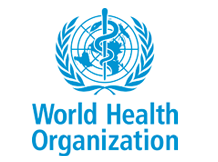
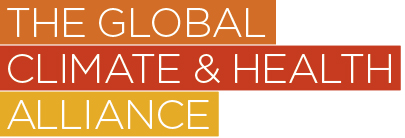
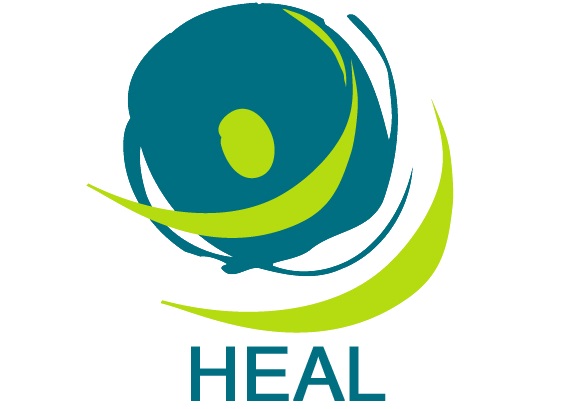
PARTNERING ORGANIZATIONS
Canadian Association of Physicians for the Environment
Climate and Health Council
Health Care Without Harm
International Federation of Medical Students’ Associations
OraTaiao: New Zealand Climate and Health Council
U.K Health Alliance on Climate Change
U.S. Climate and Health Alliance
